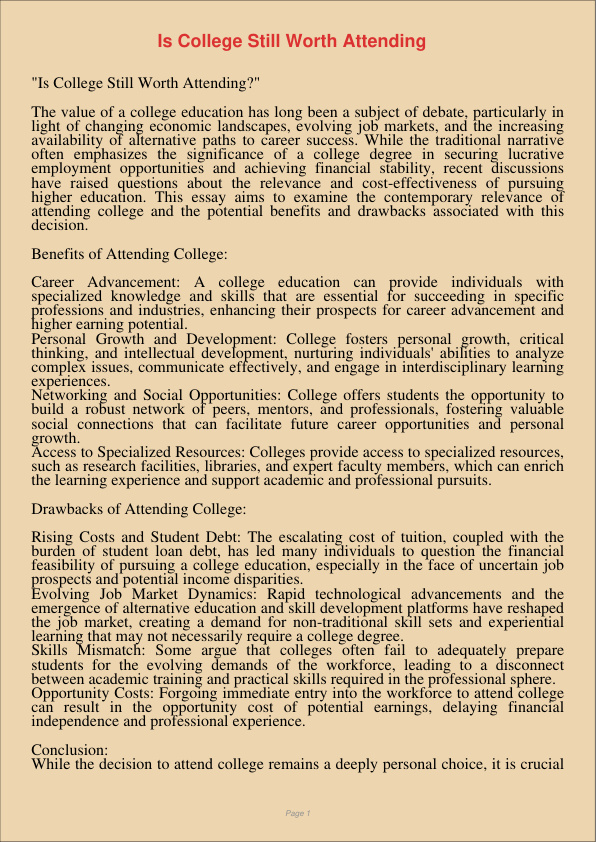Is College Still Worth Attending
Dec 31, 2023
college still worth attending
Marketing
Education
“Is College Still Worth Attending?”
The value of a college education has long been a subject of debate, particularly in light of changing economic landscapes, evolving job markets, and the increasing availability of alternative paths to career success. While the traditional narrative often emphasizes the significance of a college degree in securing lucrative employment opportunities and achieving financial stability, recent discussions have raised questions about the relevance and cost-effectiveness of pursuing higher education. This essay aims to examine the contemporary relevance of attending college and the potential benefits and drawbacks associated with this decision.
Benefits of Attending College:
Career Advancement: A college education can provide individuals with specialized knowledge and skills that are essential for succeeding in specific professions and industries, enhancing their prospects for career advancement and higher earning potential. Personal Growth and Development: College fosters personal growth, critical thinking, and intellectual development, nurturing individuals’ abilities to analyze complex issues, communicate effectively, and engage in interdisciplinary learning experiences. Networking and Social Opportunities: College offers students the opportunity to build a robust network of peers, mentors, and professionals, fostering valuable social connections that can facilitate future career opportunities and personal growth. Access to Specialized Resources: Colleges provide access to specialized resources, such as research facilities, libraries, and expert faculty members, which can enrich the learning experience and support academic and professional pursuits.
Drawbacks of Attending College:
Rising Costs and Student Debt: The escalating cost of tuition, coupled with the burden of student loan debt, has led many individuals to question the financial feasibility of pursuing a college education, especially in the face of uncertain job prospects and potential income disparities. Evolving Job Market Dynamics: Rapid technological advancements and the emergence of alternative education and skill development platforms have reshaped the job market, creating a demand for non-traditional skill sets and experiential learning that may not necessarily require a college degree. Skills Mismatch: Some argue that colleges often fail to adequately prepare students for the evolving demands of the workforce, leading to a disconnect between academic training and practical skills required in the professional sphere. Opportunity Costs: Forgoing immediate entry into the workforce to attend college can result in the opportunity cost of potential earnings, delaying financial independence and professional experience.
Conclusion:
While the decision to attend college remains a deeply personal choice, it is crucial to consider the individual’s career aspirations, financial circumstances, and learning preferences. College education continues to offer a range of invaluable benefits, including career prospects, personal development, and access to specialized resources. However, the rising costs, evolving job market dynamics, and potential skills mismatch suggest that individuals should carefully evaluate the potential return on investment and consider alternative educational pathways that may align more closely with their career goals and financial aspirations. Ultimately, the relevance of attending college lies in its ability to provide individuals with the necessary tools and resources to achieve their professional aspirations and personal growth, making it a pivotal decision that requires careful consideration and strategic planning.
